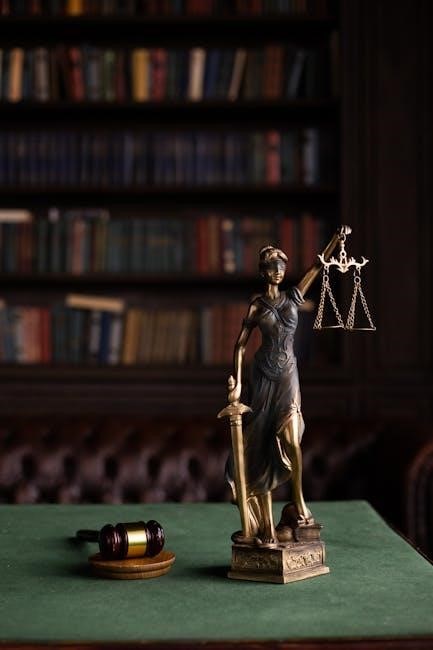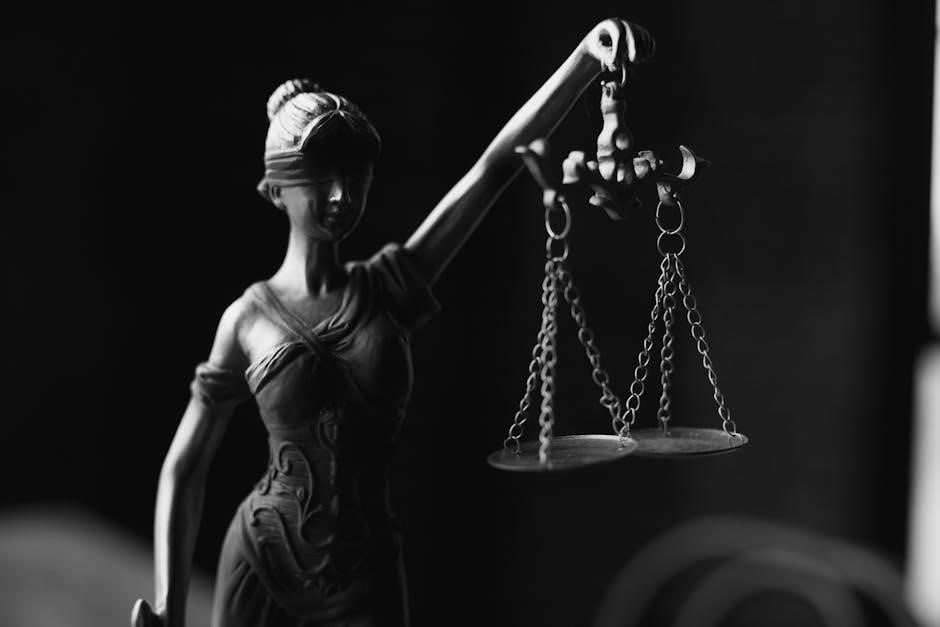
rawls theory of justice pdf
John Rawls’ A Theory of Justice (1971) introduces the concept of “justice as fairness,” advocating for a democratic society with equal basic liberties and fair opportunities.
1.1 Overview of Justice as Fairness
Rawls’ “justice as fairness” posits that societal institutions should ensure equal basic liberties and fair opportunities for all. This concept, introduced in A Theory of Justice (1971), emphasizes fairness as the foundation of justice, challenging utilitarian approaches. It advocates for a democratic society where principles of justice are chosen behind the “veil of ignorance,” ensuring impartiality and equality for all individuals, fostering a just and fair social order.
1.2 Historical Context and Influence
Rawls’ A Theory of Justice (1971) emerged during a period of social and political transformation, challenging utilitarian and libertarian views. His ideas revitalized political philosophy, influencing debates on equality, fairness, and distributive justice. Critics like Thomas Pogge questioned its global applicability, while others praised its originality. The theory remains a cornerstone of modern political thought, shaping discussions on justice and democracy worldwide.
The Original Position and the Veil of Ignorance
Rawls’ original position and veil of ignorance are central to his theory, imagining individuals choosing principles of justice without knowing their personal circumstances, ensuring fairness and equality.
2.1 Definition and Purpose
The original position is a hypothetical scenario where individuals, behind a “veil of ignorance,” choose principles of justice without knowing their personal characteristics. This ensures fairness and equality, as decisions are based on reasoning rather than self-interest. The purpose is to establish a just society by ensuring principles are chosen impartially, prioritizing the well-being of the least advantaged through the difference principle.
2.2 Criticisms and Controversies
Rawls’ theory has faced criticism, particularly from philosophers like Thomas Pogge, who argues that Rawls’ domestic and global justice frameworks are inconsistent. Collectivists claim Rawls’ theory justifies capitalism, while others, like communitarians, argue it neglects community values. Some critics, such as Robert Nozick, contend that Rawls’ egalitarian approach undermines individual freedoms. Additionally, critics argue that the veil of ignorance detaches justice from personal values and aspirations, potentially leading to procedural fairness without addressing deeper moral concerns.

The Two Principles of Justice
Rawls’ theory outlines two principles of justice: equal basic liberties and fair equality of opportunity. These principles ensure fair distribution of societal benefits and burdens, guiding institutions to promote justice and equality for all citizens.
3.1 The First Principle: Equal Basic Liberties
Rawls’ first principle of justice prioritizes equal basic liberties for all citizens, ensuring fundamental rights like freedom of speech, religion, and political participation. These liberties are universal and cannot be sacrificed for other benefits, forming the foundation of a just society. This principle guarantees equality in basic rights, essential for individual dignity and democratic functioning, and takes precedence over the second principle in Rawls’ framework.
3.2 The Second Principle: Fair Equality of Opportunity and the Difference Principle
Rawls’ second principle combines fair equality of opportunity and the difference principle. It ensures equal access to education, jobs, and political offices, while the difference principle permits inequalities only if they benefit the least advantaged. This principle aims to balance economic disparities, ensuring social and economic inequalities are arranged to the greatest benefit of the least privileged, fostering a just society;
Rawls’ Response to Utilitarianism
Rawls critiques utilitarianism for prioritizing aggregate welfare over individual rights, arguing that justice as fairness ensures inequalities benefit all, particularly the least advantaged.
4.1 Critique of Utilitarian Approaches
Rawls critiques utilitarianism for prioritizing aggregate welfare over individual rights, arguing that it may justify sacrificing some for the greater good. He contends that utilitarianism fails to provide a robust framework for protecting basic liberties and ensuring fair distribution, as it allows inequalities that do not benefit the least advantaged. This criticism forms the foundation of his alternative theory of justice as fairness.
4.2 Justice as Fairness vs. Maximizing Welfare
Rawls’ justice as fairness prioritizes equal basic liberties and fair opportunities over maximizing welfare, unlike utilitarianism. He argues that justice should not be compromised for aggregate welfare, emphasizing the protection of individual rights and the fair distribution of benefits. This approach ensures that societal arrangements benefit the least advantaged, aligning with his difference principle, rather than solely pursuing overall happiness or well-being.

The Role of Primary Goods
Primary goods are essential for effective participation in society, ensuring basic rights, liberties, and opportunities. They are central to Rawls’ theory, enabling individuals to pursue their ends.
5.1 Definition and Significance
Primary goods, as defined by Rawls, are essential resources and liberties necessary for individuals to pursue their life plans. These include basic rights, liberties, opportunities, income, and wealth. Their significance lies in enabling individuals to effectively participate in society and achieve their ends. Rawls emphasizes their distribution according to principles of justice to ensure fairness and equality of opportunity for all members of society.
5.2 Distribution and Fairness
Rawls advocates for distributing primary goods according to the Difference Principle, ensuring inequalities benefit the least advantaged. Fair distribution is achieved by prioritizing equal basic liberties and opportunities, with economic and social resources allocated to promote the common good. This approach ensures fairness by addressing disparities and guaranteeing all individuals access to essential resources for their well-being and participation in society.
The Concept of the Basic Structure of Society
Rawls’ concept of the basic structure refers to society’s main institutions, such as the economy and legal system, which distribute benefits and burdens, shaping justice and individual life chances.
6.1 Institutions and Their Role in Justice
Rawls emphasizes that justice is realized through the basic structure of society, particularly its major institutions. These include the political, economic, and legal systems, which distribute rights, liberties, and resources. Institutions are central to ensuring fairness, as they establish the rules and practices that govern social cooperation. Rawls argues that justice is not merely a matter of individual actions but is fundamentally shaped by the design of these institutions, which must align with the principles of justice derived from the original position.
6.2 Fairness in Social and Economic Institutions
Rawls argues that fairness in social and economic institutions is achieved by ensuring equal opportunities and basic liberties for all citizens. He emphasizes the role of the difference principle, which allows inequalities only if they benefit the least advantaged. Institutions must be designed to prevent unjust distributions of primary goods, ensuring that social and economic systems align with the principles of justice as fairness.
Challenges and Critiques of Rawls’ Theory
Rawls’ theory faces critiques from communitarians, libertarians, and global justice advocates, questioning its applicability beyond nation-states and its handling of distributive justice and individual rights.
7.1 Communitarian and Libertarian Criticisms
Communitarians argue Rawls’ theory neglects the importance of community and shared values, while libertarians, like Robert Nozick, critique its emphasis on distributive justice over individual rights and property. Michael Sandel contends Rawls’ focus on individualism undermines the role of collective identity in shaping justice. These critiques challenge the balance between equality and liberty in Rawls’ framework, questioning its applicability to diverse societal contexts and moral priorities.
7.2 Global Justice and Its Limitations
Rawls’ theory of global justice, as outlined in The Law of Peoples, has been criticized for its limitations in addressing international inequalities. Critics like Thomas Pogge argue that Rawls’ approach fails to adequately address global poverty and human rights violations, focusing instead on a “society of peoples” rather than individuals. This raises concerns about the applicability of Rawls’ principles to global justice, highlighting the need for a more inclusive framework;

Rawls’ Later Work: Political Liberalism
Rawls’ Political Liberalism refines his theory of justice, emphasizing the need for an overlapping consensus among diverse societies to establish fair principles without relying on metaphysical assumptions.
8.1 Transition from A Theory of Justice to Political Liberalism
Rawls transitioned to Political Liberalism to address concerns about pluralism and stability, refining his theory to ensure justice as fairness could coexist with diverse moral frameworks in a democratic society.
8.2 The Idea of Overlapping Consensus
Rawls introduced the concept of overlapping consensus in Political Liberalism, proposing that diverse moral frameworks could converge on core principles of justice. This idea ensures stability in a pluralistic society by fostering agreement on basic institutions and values, allowing citizens with differing beliefs to endorse a shared public conception of justice.
Rawlsian justice applies to global fairness, human rights, and economic policies, emphasizing equality and property-owning democracy to promote social justice and equitable distribution of resources.
Applications of Rawlsian Justice
9.1 Global Justice and Human Rights
Rawls’ theory extends to global justice, emphasizing fair international relations and human rights. His principles advocate for reducing global inequalities and ensuring basic rights universally. Critics like Thomas Pogge argue Rawls’ framework inadequately addresses global poverty, highlighting tensions between domestic and global justice. Despite this, Rawls’ ideas remain influential in shaping moral foundations for global fairness and human rights.
9.2 Economic Policies and Property-Owning Democracy
Rawls advocates for a property-owning democracy to ensure fair economic conditions. His theory proposes policies that reduce inequalities and guarantee equal opportunities. Critics argue his framework aligns with capitalism, potentially undermining social justice. Rawls emphasizes institutions that distribute resources fairly, ensuring all citizens can fully participate in society. This approach aims to balance economic freedom with social equity, reflecting his commitment to justice as fairness.

The Legacy of Rawls’ Theory
Rawls’ theory of justice as fairness has profoundly influenced political philosophy, shaping debates on equality, liberty, and social justice, remaining central to contemporary ethical and political thought.
10.1 Influence on Political Philosophy
Rawls’ theory of justice as fairness revolutionized political philosophy by challenging utilitarianism and prioritizing equality and fairness. His concepts of the original position and primary goods have deeply influenced debates on distributive justice, shaping liberal and democratic thought globally. His work remains foundational in addressing questions of equality, liberty, and social justice, inspiring both supporters and critics alike in ongoing philosophical discussions.
10.2 Contemporary Debates and Relevance
Rawls’ theory remains central to contemporary debates in political philosophy, with ongoing discussions about its applicability to global justice, economic inequality, and multicultural societies. Critics argue its limitations in addressing historical injustices and global disparities, while supporters emphasize its enduring relevance in shaping liberal democratic values. Its influence extends to current policy debates on distributive justice and human rights, ensuring its continued importance in modern philosophical discourse.
Rawls’ theory of justice as fairness remains a cornerstone of political philosophy, offering a moral framework for evaluating societies and inspiring ongoing debates about equality and rights.
11.1 Summary of Key Ideas
John Rawls’ theory of justice as fairness emphasizes equal basic liberties, fair opportunities, and the difference principle. His original position and veil of ignorance concept argue for principles ensuring fairness. Critiquing utilitarianism, Rawls prioritizes justice over welfare maximization. His work highlights social justice and primary goods, offering a moral framework for society. This theory remains influential, inspiring debates on equality and rights globally.
11.2 The Enduring Importance of Justice as Fairness
Rawls’ theory of justice as fairness remains vital for addressing social inequalities and ensuring moral frameworks. Its emphasis on equal liberties, fair opportunities, and the difference principle continues to guide debates on equality and rights. By prioritizing justice over utility, Rawls’ ideas inspire global justice and human rights discussions, offering a timeless approach to creating a fair and equitable society for all members to thrive.